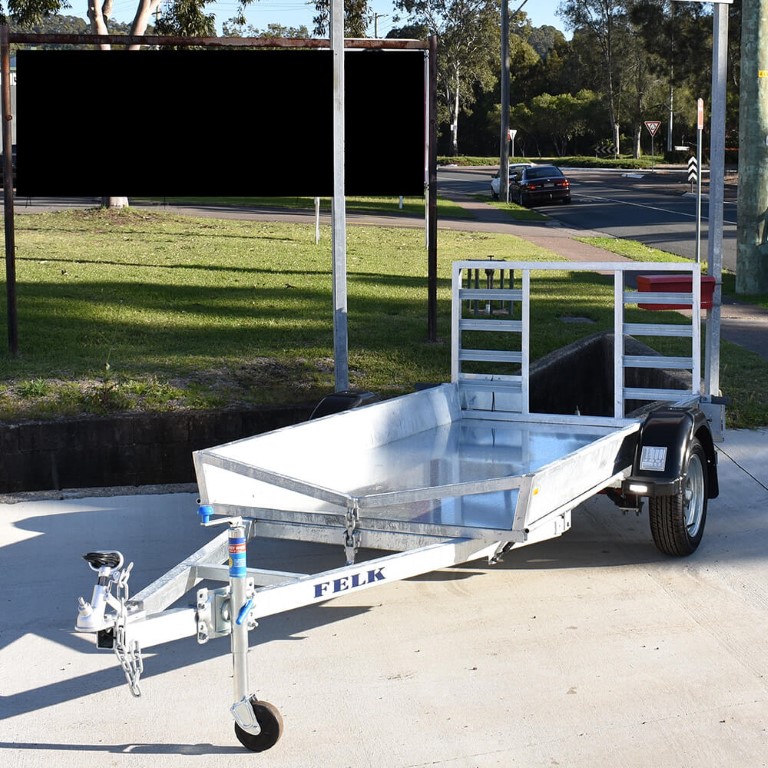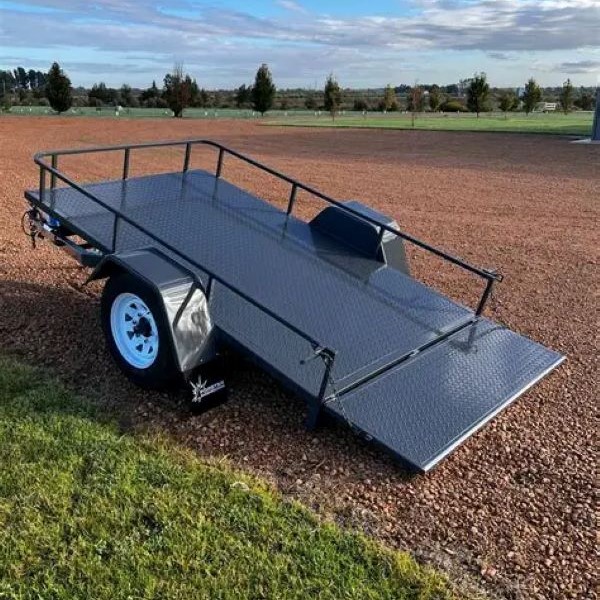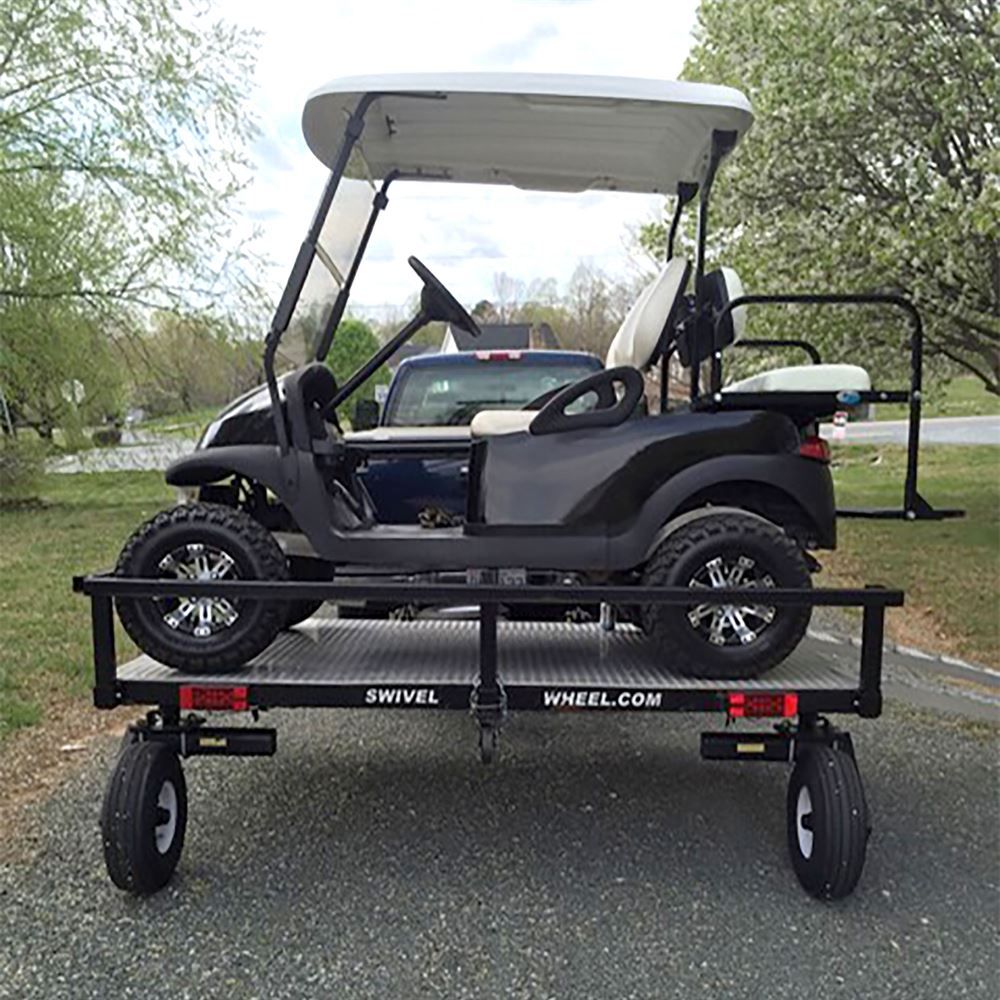For golfers, property owners, and outdoor enthusiasts, a golf cart trailer is more than just an accessory—it’s a game-changer. This specialized trailer allows you to transport your golf cart safely and efficiently over long distances.
Moreover, many people use golf carts for more than just the course. They drive them on private roads, construction sites, campgrounds, and large estates. However, moving them without a proper setup can be risky or impossible.
That’s where the golf cart trailer comes in. It provides a stable, secure platform for hauling your cart from one location to another. Most models feature ramps, tie-down points, and wheel cradles for maximum safety.
They also come in various sizes and weight capacities. Some support standard 4-seater carts. Others handle heavy-duty utility vehicles. This flexibility makes them ideal for different needs.
In addition, many golf cart trailers are lightweight and easy to tow. They work with small trucks, SUVs, or even larger ATVs.
Because they expand your cart’s usability, investing in a golf cart trailer means unlocking new possibilities. Whether you’re relocating, camping, or maintaining land, it’s a smart addition to your gear.
 Types of Cart Trailers
Types of Cart Trailers
Choosing the right golf cart trailer is essential for safe and efficient transportation. Understanding the different types of trailers can help you make the best decision.
Enclosed Golf Cart Trailers
Enclosed golf cart trailers completely cover the cart. They provide protection from weather, dirt, and road debris. These trailers are ideal for long-distance travel and keeping your cart in pristine condition. They often come with secure locking systems, adding an extra layer of safety. However, enclosed trailers tend to be heavier and more expensive than other types.
Open Golf Cart Trailers
Open trailers do not have a covering. They are lighter and more affordable compared to enclosed trailers. These trailers are easy to load and unload. Open trailers are suitable for short distances or in good weather conditions. Despite the lower cost, they expose your cart to weather and road hazards.
Tilt Bed Golf Cart Trailers
Tilt bed trailers have a tilting platform for easier loading and unloading. This type of golf cart trailer is ideal for those who want convenience in transporting their carts. The tilt mechanism eliminates the need for ramps, saving you extra effort. It’s a practical option for anyone who frequently uses their golf cart in various locations.
Understanding these different types of golf cart trailers helps you choose one that suits your needs. Each type offers its own advantages and potential drawbacks based on your requirements.
Key Features to Consider When Selecting a Trailer
Choosing the right golf cart trailer involves evaluating several key features. These factors ensure the trailer meets your specific needs.
Size and Dimensions
The trailer must match your golf cart’s size. Measure your cart’s length, width, and height carefully. Ensure the trailer provides enough space for secure loading and unloading. Oversized trailers might be unnecessarily bulky, while undersized ones could damage your cart.
Weight Capacity
Check the trailer’s weight capacity to handle your golf cart safely. An overloaded trailer can lead to accidents or damage. Consider the combined weight of the golf cart and any additional gear. Choose a trailer with a capacity slightly higher than your cart’s weight for added safety.
Material and Durability
The durability of the golf cart trailer depends on its material. Common materials include steel and aluminum. Steel trailers are stronger but heavier, while aluminum is lightweight and resistant to rust. Select a material that suits your usage and location, especially in areas with harsh weather.
Hitch Compatibility
The trailer must be compatible with your towing vehicle’s hitch. Check the hitch type and size before purchase. A compatible hitch ensures stable towing and prevents accidents. If in doubt, consult your vehicle’s manufacturer or user manual.
Understanding these key features helps you select the best golf cart trailer. Prioritize quality and compatibility to ensure a safe and hassle-free experience.
 Benefits of Using a Cart Trailer
Benefits of Using a Cart Trailer
Transporting your golf cart safely requires a reliable golf cart trailer. A trailer offers convenience, protection, and other benefits. Let’s explore the advantages of using a golf cart trailer.
Enhanced Transportation
A golf cart trailer simplifies the transportation process. With a trailer, you can move your golf cart easily to golf courses, repair shops, or storage places. It ensures your cart reaches its destination without strain. Trailers are also useful for long-distance travels, offering efficient and hassle-free transport. This avoids the need to drive your cart long distances, which could save wear and tear.
Protection of Your Golf Cart
Using a golf cart trailer protects your vehicle from potential damage. Enclosed trailers shield your cart from adverse weather, like rain, snow, or intense sunlight. This prevents rust, corrosion, or fading of paint. It also safeguards from road debris, ensuring your cart stays clean and free of scratches. This protection helps prolong your cart’s lifespan and maintain its appearance.
Versatility for Other Uses
A golf cart trailer is not limited to just carts. You can use it to transport other items, such as lawn mowers, motorcycles, or small ATVs. This versatility makes owning a trailer cost-effective. Whether moving equipment, furniture, or other belongings, your trailer can handle various tasks. It’s an excellent investment for multiple transportation needs.
A golf cart trailer is a valuable tool for anyone owning a golf cart. Its ability to provide safe transport, protect your investment, and serve multiple purposes makes it a smart purchase. Choose the right trailer to enjoy these benefits fully.
How to Measure Your Golf Cart for a Trailer
Measuring your golf cart correctly ensures it fits securely onto the trailer. Accurate measurements prevent damage or instability during transport.
Steps to Take Proper Measurements
- Measure Length: Use a measuring tape to check the golf cart’s length from front to back. Include bumpers or attachments in the measurement.
- Measure Width: Measure the widest part of the golf cart, including tires or side accessories. Ensure you measure edge-to-edge accurately.
- Measure Height: Determine the cart’s height from the ground to its tallest point. Consider roof racks, canopies, or equipment mounted on top.
- Account for Additional Space: Add a few extra inches to each measurement for clearance. This avoids squeezing the cart into tight spaces.
- Measure Trailer Opening: Check the dimensions of the trailer entry to match your golf cart measurements. This ensures smooth loading and unloading.
Importance of Accurate Sizing
- Avoid Damage: Incorrect sizing may damage your golf cart or trailer during transport.
- Ensure Safety: A properly sized trailer minimizes risks of tipping or sliding.
- Optimize Fit: Accurate measurements ensure your golf cart fits snugly without wasted space.
- Improve Handling: A well-sized trailer enhances stability when driving with the golf cart.
Accurate measurements are essential for safe and effective use of your golf cart trailer. Follow these steps diligently for the best transport experience.
Maintenance Tips for Cart Trailers
Proper maintenance of your golf cart trailer ensures safety and extends its lifespan. Consistent care reduces the risk of damage and ensures smooth operations.
Regular Cleaning and Inspection
- Clean the Trailer Regularly: Wash the trailer to remove dirt, mud, and road debris.
- Inspect for Damage: Look for cracks, rust, or worn parts during routine checks.
- Lubricate Moving Parts: Apply grease or oil to hinges and other mobile components.
- Check Lights and Wiring: Test all electrical connections and repair any faults immediately.
Cleaning and inspection prevent long-term issues and ensure the trailer stays in top condition.
Tire Care and Load Balance
- Check Tire Pressure: Maintain correct tire pressure for better stability and safety.
- Inspect Tire Tread: Ensure tires are in good condition and replace worn ones promptly.
- Adjust Load Balance: Place the golf cart evenly to distribute weight across the trailer.
- Avoid Overloading: Follow weight capacity guidelines to prevent tire damage and accidents.
Proper tire care and load balance improve trailer performance and reduce wear.
Securing and Storing the Trailer
- Secure Trailer Properly: Use locks and clamps to prevent unauthorized access or movement.
- Store in a Dry Place: Keep the trailer in a sheltered area to avoid rust and damage.
- Use Covers: Protect the trailer from dust and weather by covering it while stored.
- Check Parking Brakes: Ensure brakes are functioning when the trailer is stationary.
Proper storage and securing techniques keep your golf cart trailer safe when not in use.
Regular maintenance guarantees your golf cart trailer serves you reliably for years. Follow these tips to avoid costly repairs and ensure safe transport.
 Safety Guidelines for Transporting a Golf Cart
Safety Guidelines for Transporting a Golf Cart
Transporting a golf cart safely requires careful planning and attention to detail. Following simple safety guidelines can prevent accidents and protect your golf cart and trailer.
Properly Loading and Securing the Golf Cart
- Position the Trailer on Level Ground: Always park the trailer on a flat surface before loading.
- Use Ramps for Easy Loading: Align the ramps properly to ensure smooth and safe loading.
- Center the Golf Cart: Align the cart evenly in the trailer to distribute weight.
- Secure with Straps: Use heavy-duty straps to tie down the cart and prevent movement during transport.
- Check Stability: Ensure the cart is stable and cannot tip or slide.
Driving Tips with a Trailer Attached
- Adjust Driving Speed: Drive slower than usual when towing your golf cart trailer.
- Maintain Safe Distance: Keep extra space between you and other vehicles.
- Avoid Sharp Turns: Make wide turns to prevent trailer instability.
- Brake Gradually: Avoid sudden stops to minimize trailer swaying.
- Check Mirrors Regularly: Ensure clear visibility of the trailer while on the road.
Inspection Before and After Every Trip
- Inspect the Hitch Connection: Check the hitch for secure attachment before starting.
- Examine Tires and Lights: Ensure tires are inflated and lights are working.
- Test Brakes: Confirm the trailer’s brakes are functioning properly.
- Recheck Straps: Verify the golf cart remains securely tied down.
- Look for Damage: After each trip, check the trailer for any signs of wear or damage.
By following these safety guidelines, you can ensure smooth and secure operation. Proper loading, cautious driving, and frequent inspections are key to successful golf cart transportation.
Top Brands and Models of Cart Trailers
Choosing a quality golf cart trailer is easier by knowing the top brands and models. Reputable brands provide reliable, durable trailers suited to various needs.
Reliability and Customer Reviews
- Top Brands Trusted by Users: Look for brands like Aluma, E-Z-GO, and Triton known for durability and performance.
- High Customer Ratings: Check reviews for consistent positive feedback on build quality and user experience.
- Warranty and Support: Reputable brands offer warranties and responsive customer service for peace of mind.
- Proven Track Record: Established brands often ensure reliable trailers trusted by long-time users.
Researching reviews helps identify products with strong reliability and good customer satisfaction. Avoid low-rated options.
Popular Trailers in the Market
- Aluma A8812: Lightweight, rust-resistant aluminum trailer with great portability and load capacity.
- E-Z-GO Hauler: Designed for golf carts, offering convenience, durability, and ease of use.
- Triton AUT Series: Sturdy, versatile tilt bed trailers ideal for frequent and easy transport.
- Carry-On 6×12 Utility Trailer: Wide and robust, perfect for transporting carts and other equipment.
- Featherlite 1693: Excellent enclosed aluminum trailer providing solid protection for your cart.
Consider trailers with features matching your requirements. Weigh aspects like size, material, and additional amenities.
Selecting the best golf cart trailer involves understanding brand reputation and finding the most suitable model. Focus on quality, reviews, and essential features for the best purchase.
 Frequently Asked Questions About Cart Trailers
Frequently Asked Questions About Cart Trailers
Do I need brakes on my golf cart trailer?
Yes, if it exceeds 1,500 lbs or local laws require them. Surge brakes are common.
Can I tow a golf cart trailer with an SUV?
Yes, most mid-size and full-size SUVs can tow 2,000+ lbs. Check your vehicle manual.
How fast can I drive with a golf cart trailer?
Stick to 55 mph or lower. High speeds increase sway and reduce control.
Are golf cart trailers hard to assemble?
Most come pre-assembled or require minimal setup. Follow the manufacturer’s guide.
Can I store my golf cart on the trailer?
Yes, but only if kept in a dry, covered area. Outdoor storage may lead to rust.
What size hitch ball do golf cart trailers use?
Most use a 2-inch ball. Confirm before purchasing or towing.
Do golf cart trailers come with warranties?
Yes, many offer 1–5 year structural warranties. Check details before buying.
Can I use a folding trailer for daily use?
Yes, if built for frequent deployment. Look for durable hinges and locking mechanisms.
 Final Thoughts on the Value of a Cart Trailer
Final Thoughts on the Value of a Cart Trailer
Owning a golf cart trailer transforms how you use your vehicle. It removes distance limits and expands your range of activity.
From moving your cart across town to supporting work on large properties, it delivers unmatched utility.
Moreover, it protects your investment. Transporting your cart safely reduces wear and potential damage.
With various styles and features available, there’s a golf cart trailer for every need and budget.
Whether you’re a golfer, landowner, or outdoor adventurer, this tool enhances freedom and efficiency.
Ultimately, a golf cart trailer is not just a carrier—it’s an essential part of maximizing your golf cart’s potential.